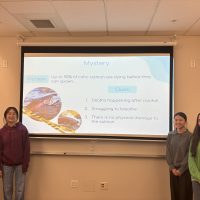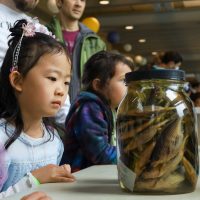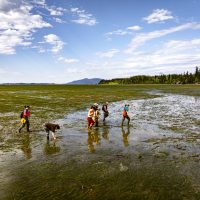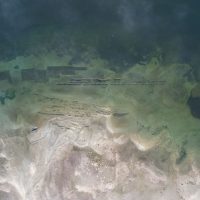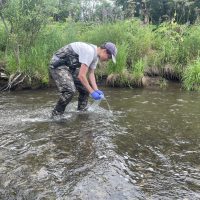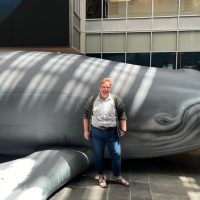Filter Results
High schoolers design and teach a lesson on Pacific salmon and chemicals
What brought a group of high schoolers to SAFS to teach a lesson on Pacific salmon and chemicals? It all started with an interest in ecology in 9th grade biology class, and a quest to find a relevant, local topic that they could base a research project on. Since then, Iris Zhang, Ivy Wei and Sylvia Mei from Redmond High School worked with Amirah Casey to research the topic, and developed a SEAS lesson centered on the effects of 6PPD-quinone on salmon.
Read moreMore than 1,000 people attend the UW Aquatic Sciences Open House
Returning for another successful year on Saturday 17 May, the UW Aquatic Sciences Open House had more than 1,000 attendees, with children of all ages plus their families. Organized by Students Explore Aquatic Sciences (SEAS), the event showcases the breadth of aquatic science taking place at the University of Washington and in the Puget Sound region with partner organizations.
Read moreMuckin’ around: An undergraduate fieldtrip to explore seagrass ecosystems
During low tide at Padilla Bay on a bright day in early May, you could find a class of UW undergraduates exploring the largest contiguous seagrass ecosystem in the lower 48. Why? To collect data to assess the habitat value of seagrass.
Read moreTulalip Tribes Hiring Wetland/Ecological Restoration Technician
Tulalip Tribes is hiring a full time temporary Wetland/Ecological Restoration Technician to work as an assistant to the Wetland Program Coordinator. The Wetland Technician will conduct field work in vegetation monitoring and management including developing skills in plant identification, invasive species control, maintaining stream and wetland restoration projects, data collection and management, and use of field data collection equipment including GPS.
Read moreCongratulations to the recipients of the SAFS Faculty Merit Award
Congratulations to the four recipients of the SAFS Faculty Merit Award, awarded to outstanding scholars and members of the SAFS community: Emma Meyer (BS), Liz Allyn (MS), Amelia DuVall (PhD), and Kristin Privitera-Johnson (PhD).
Read moreChanging waters, changing views: Stakeholder perspectives on ocean acidification and adaptations in shellfish aquaculture
Shellfish aquaculture is a vital industry in the US, but one which faces mounting challenges threatening both productivity and business viability. Research often fails to align with growers’ immediate needs, so to close this gap, a team led by Connor Lewis-Smith set out to document how industry participants perceive ocean acidification threats and evaluate emerging adaptation strategies that are actively being researched.
Read moreCall for Applications: Erasmus+ KA171 Graduate Student Mobility Fellowship
Are you interested in advancing your academic and research experience in marine ecophysiology and environmental chemistry while immersing yourself in Italian culture? The University of Washington and the University of Milano-Bicocca (UNIMIB) are excited to announce a fellowship opportunity through the Erasmus+ KA171 program. Apply by May 26th, 2025.
Read moreCoursework, capstone, and connections: The multi-dimensional nature of the SAFS undergraduate degree
For many students about to embark on their undergraduate journey at university, they plan to study one thing but end up studying something completely different. This was the case for SAFS undergraduate, Ryan Luvera. Ryan is currently undertaking his capstone research project, focusing on improving salmon abundance estimation models using eDNA.
Read moreBig Water Consulting Hiring Research Assistant/Intern
Big Water Consulting is pleased to offer a unique opportunity for an internship with a private, but public interest-oriented, consulting firm working on dynamic and evolving projects directly focused on enhancing the ability of tribal governments, housing authorities, and service providers use data to plan for the future and improve the communities they work for and in. One such project, the Northern Cheyenne Health and Housing Needs Assessment, is helping a tribe in rural Montana exercise its tribal data sovereignty by facilitating the tribe’s collection of data that accurately describes community conditions and preparation of reporting materials that will properly tell the community’s story and enable tribal leaders and program staff to plan for the future and attract the funding that their community needs.
Read moreZoe Rand, QERM PhD student, chosen as College of the Environment Graduate Dean’s Medalist
Zoe Rand is a recipient of this year’s College of the Environment Graduate Dean’s Medalist award, a PhD student in the Quantitative Ecology & Resource Management (QERM) Program and member of SAFS Professor Trevor Branch’s lab, using mathematical and statistical models to study the population dynamics of baleen whales.
Read more